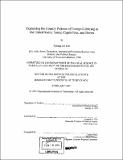Explaining the country patterns of foreign lobbying in the United States : issues, capabilities, and norms
Author(s)
Kim, Byoung-Joo, 1965-
DownloadFull printable version (10.08Mb)
Advisor
Kenneth A. Oye.
Terms of use
Metadata
Show full item recordAbstract
This study proposes and tests three models of foreign lobbying in the United States. The "Reaction Model" assumes that the foreign lobbying results largely from countries' desire to act when issues related to them catch US public attention. The "Resource Model" assumes that the countries that can afford it do more foreign lobbying in order to cultivate friendly atmosphere in Washington. The "Norms Model" assumes that the foreign lobbying is a result of countries doing in Washington what they are used to doing at home. This research shows that the "Reaction Model" best explains and predicts the varying country patterns in foreign lobbying in the US, while the "Resource Model" and the "Norms Model" also show importance in determining how much foreign lobbying countries do. The research has produced country data sets as dependent variables, based on 2,034 records of foreign representation carried out on behalf of 53 countries between 1988 and 1991. The data have shown significant variations among different countries. In explaining the variations, the study has chosen three categories of independent variables. For the first group, the "issues" variables, several different measurements are used for measuring political and economic issues raised in the US with regard to each country. The "capabilities" variables are indicators of national wealth and measurements of countries' knowledge of and familiarity with-the US system. They reflect economic and knowledge resources that allow necessary actions to be implemented. The "norms" variables reflect the degree of pluralism in each country or the degree of similarity between the US and foreign country's business practices. They have been chosen based on the expectation that the norms would limit a country's set of options in lobbying. Multivariate regression has yielded various findings. Most importantly, the frequency of bilateral "issues" raised in the US has the most influence in determining how much foreign lobbying a country does. In addition, the countries that are more familiar with the US system ("capabilities") tend to focus more on advocacy lobbying to the Congress than other countries do. And, the countries where business cultures are similar to the US ("norms") are more active in the overall trade lobbies and in the advocacy lobbying to the Congress.
Description
Thesis (Ph.D.)--Massachusetts Institute of Technology, Dept. of Political Science, 1999. Includes bibliographical references.
Date issued
1999Department
Massachusetts Institute of Technology. Department of Political SciencePublisher
Massachusetts Institute of Technology
Keywords
Political Science